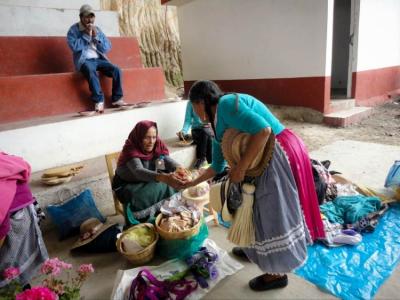
Two corn cakes for a loaf of bread. A liter of oats for an avocado and a bag of beans. An hour with a traditional healer for an hour of plumbing work. Ten mixiuhcas—the market’s currency of choice—for a jar of pickled carrots. Not a single peso in sight.
Vendors and buyers have gathered today in one of the city’s small urban gardens for this month’s Feria Multitrueke, an alternative economy and bartering market. Hipsters pushing organic quelite seeds mix with elders standing over steaming vats of hot chocolate and tamales. Women in aprons dole out tacos while their kids dart between stands. Shirts woven by a Mazahua indigenous women’s cooperative are displayed next to copies of the translated Complete Works of Rosa Luxemburg.
The air is alive with voices laughing, bartering and making sales. But these vendors aren’t ordinary vendors, and their buyers aren’t just customers, either. “We are all prosumidores here,” says Joaquina Flores, a member of the mixiuhca network. Prosumidor is a combination of the Spanish words for producer and consumer, highlighting the reciprocal nature of the market. “It’s solidarity,” Flores says. “This is about meeting needs, not generating wealth.”
The mixiuhca is one of many Mexican monedas comunitarias, communal or local currencies fostered since the 1990s, drawing on indigenous bartering practices. “Pesos generate violence, they fund wars, drug and human trafficking, GMO crops, international corporations, inequality,” says one prosumidor. “Community money doesn’t.”
Read the rest at In These Times
Go to the GEO front page

Add new comment